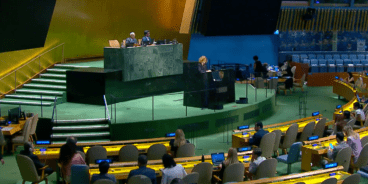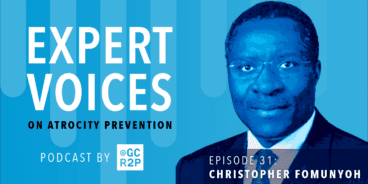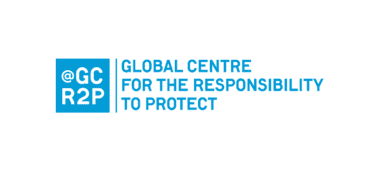Statement by Dr. Simon Adams on behalf of the Global Centre for the Responsibility to Protect at the 2016 UN General Assembly Informal Interactive Dialogue on the Responsibility to Protect
Statement delivered by Dr. Simon Adams, Executive Director of the Global Centre for the Responsibility to Protect, on 6 September 2016 at the UN General Assembly in New York.
Mr. President, I would like to thank you for organizing this informal interactive dialogue on the eighth report of the UN Secretary-General on the Responsibility to Protect.
I would like to take this occasion to express my deepest gratitude to Secretary-General Ban Ki-moon for his enduring commitment to the Responsibility to Protect (R2P). It is crucial that the next Secretary-General also makes advancing R2P and the prevention of mass atrocity crimes a core priority.
The consensus built over the past 11 years around the Responsibility to Protect populations from genocide, war crimes, ethnic cleansing and crimes against humanity is as strong as it is undeniable.
This has been demonstrated through the diverse array of member states that have spoken at this dialogue, including the joint statement on behalf of 49 of the members of the cross-regional Group of Friends of R2P. The Global Centre is proud to act as Secretariat for the Group of Friends and would like to thank the co-Chairs, the Kingdom of Netherlands and the Republic of Rwanda, for their leadership. The launch of a second Group of Friends of R2P in Geneva a year ago demonstrates the commitment to strengthen links across the UN and to systematically translate early warning into timely preventive action.
The UN Security Council recently adopted its 50th resolution referencing the responsibility of states to protect their populations from mass atrocity crimes and the responsibility of the international community to assist them in fulfilling that commitment. The Human Rights Council has similarly invoked this responsibility in nearly 20 resolutions and the findings of several of its commissions of inquiry. This reflects that R2P is not just an idea, but a practical guide to action.
Institutionally, more than a quarter of UN member states have appointed a national R2P Focal Point and joined the Global Network of R2P Focal Points – the largest governmental network dedicated to preventing mass atrocities. We encourage others to join the network.
Mr. President, despite these important institutional steps and significant conceptual progress, the fact that 65 million people across the world are currently fleeing conflict, atrocities and persecution, reflects a collective failure to adequately protect vulnerable populations in Syria, South Sudan and elsewhere.
Facing this crisis, the world needs UN member states to stand up for R2P, for our most fundamental human rights, for international humanitarian and refugee law, and for the International Criminal Court. Now more than ever we need strong support for initiatives such as the ACT Group’s Code of Conduct regarding Security Council action, the French and Mexican Declaration on the use of the veto in mass atrocity situations, and the Kigali Principles on the Protection of Civilians.
Mr. President, there are some who say that R2P is divisive. I would argue otherwise. There is a diversity of views in this room, but who here believes that governments should simply ignore genocide occurring within sovereign borders? That states should be permitted to commit war crimes if they deem it militarily necessary? That there should be no accountability for crimes against humanity? Or that the international community should remain silent and compliant when civilians are deliberately targeted with cluster munitions, hospitals and schools are bombed, and humanitarian aid is withheld in order to use starvation as a weapon of war?
The perceived divisiveness around R2P today is actually rooted in differing perspectives on what to do when prevention fails and it becomes necessary to act to halt atrocities. In particular, the use of force should always be a measure of last resort and must take place within the parameters of the UN Charter and with respect to prudential criteria.
But we should recall that there are currently over 100,000 UN peacekeepers deployed today with a mandate to use force to protect civilians from mass atrocities. The presence of blue helmets in Darfur, Central African Republic and elsewhere can mean the difference between life and death for the world’s most vulnerable people.
We should also be clear that the use of force is what helped protect Yazidis on Mount Sinjar from the genocide perpetrated by ISIL; it is through the use of force that states in the Lake Chad Basin are liberating captured schoolgirls from Boko Haram; and through the UN Security Council-authorized Force Intervention Brigade, MONUSCO was able to assist the DRC government in protecting its population from crimes perpetrated by M23 and the FDLR.
Mr. President, the Responsibility to Protect is a political commitment made by member states. As a principle, R2P does not possess independent agency and it cannot fail. People can fail to implement principles. Institutions can fail to uphold their mandates. The UN Security Council, for example, has fundamentally failed to take adequate action to protect populations in Syria.
Nevertheless, the era of silence and indifference in the face of mass atrocities has ended. The fate of the besieged residents of Aleppo, of Yazidi women and girls enslaved by ISIL, of the Chibok schoolgirls, of persecuted Rohingya, and of the rest of us are entwined. But it is up to the people and the states represented in this room to consistently uphold their responsibility to protect, and to act wherever and whenever people face the threat of barrel bombs, the machete or the mass grave.
Mr. President, that is why R2P was created and why its relevance and utility endures. I thank you.
Read Next
Related Content

Summary of the 2024 UN General Assembly Plenary Meeting on the Responsibility to Protect

